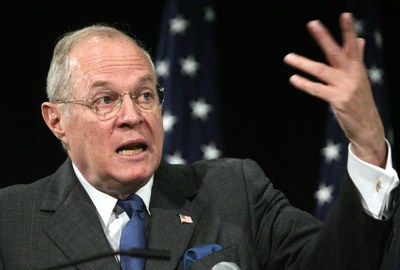Justice Kennedy’s Libertarian Consistency

So I’ve basically been on vacation during all the commentary on the decision upholding ObamaCare.
Still, I’ve found time for two brief observations.
First, eight of nine members of the Court offered straightforward and plausible opinions. Four said the limits imposed on congressional lawmaking power by the Commerce Clause rendered the law unconstitutional. Four others said, basically, there were no such limits and so the law is constitutional.
Chief Justice Roberts explained with clear eloquence why the law exceeded the limits of the Commerce Clause. But then he went on to say that (most) of the law could be upheld as part of the congressional power to tax. He said that despite the fact that the relevant (mandate) part of the law doesn’t read like a tax, was not sold to members of Congress or to the American people as a tax, and was described as not a tax by its authors and defenders.
Roberts, apparently, knocked himself out to uphold the law to protect the legitimacy of the Court and to allow what’s basically a political dispute to be decided politically. He might also be aiming to restore a more modest role for the Court in regard to reviewing laws passed by Congress and perhaps even those passed by state legislatures.
Roberts’ supporters are clearly wrong to revel in the triumph of a renewed substantial conception of the Commerce Clause as a limitation on big national government. Whether this precedent has any legs depends on the outcome of the election—on Romney winning. Otherwise the president will very likely get one or more appointees who would produce a majority for Justice Ginsburg’s much more expansive view of what Congress can do.
How does this decision affect the likely outcome of the election? Well, it might mobilize Republicans by teaching them that it’s a mistake for anyone to over-rely on the Court to protect individual rights. But it also might turn lots of Americans away from the energizing thought that ObamaCare is unconstitutional. After all, the Supreme Court, led by a brilliant Republican appointee who obviously knows his Constitution, told us otherwise.
My second point: The most consistent member of the Court, in an important way, is now Justice Kennedy. He is the most consistent libertarian. He’s been all about individual liberty—even the Court’s role in the expansion of individual liberty over time—on personal or non-economic issues such as abortion, religion, and gay rights. Now he’s the same when it comes to economic liberty—protecting the individual right to choose not to engage in commerce in the ObamaCare case. He also sided with the justices who protected the individual’s right to lie about one’s own military valor last week.
That means, of course, someone might say Kennedy is the justice most all about “judicial activism” now—most about striking down the excesses of big government on the national level (ObamaCare) and those on the state level (those outlawing abortion, allegedly establishing religion, etc.). Obviously, Kennedy’s libertarian consistency isn’t perfect, but it has become more consistent over time.





